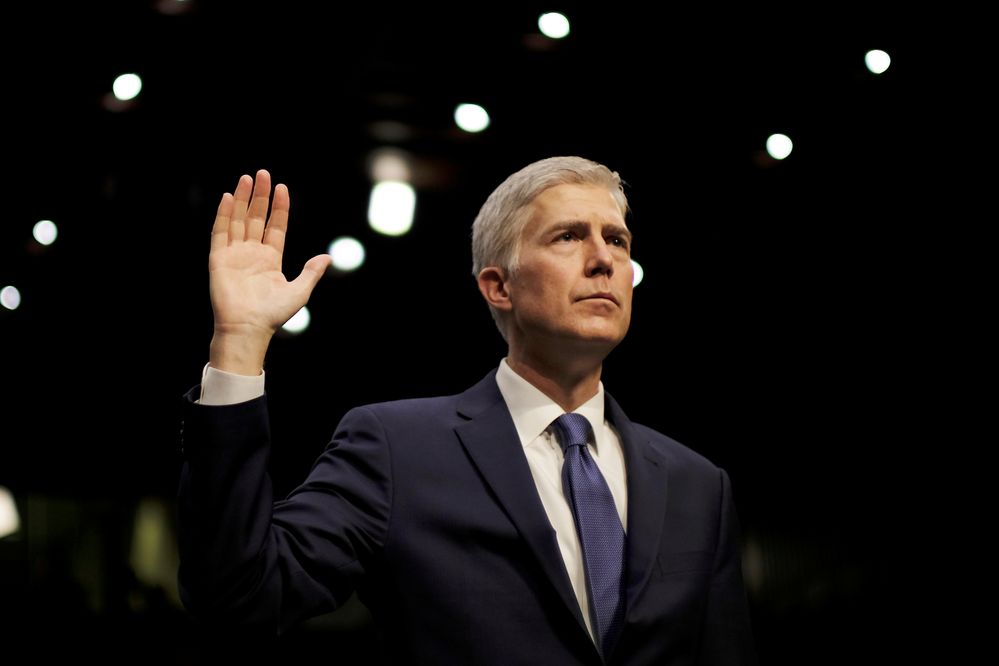President Donald Trump scored a major victory on Friday after the US Senate confirmed conservative Neil Gorsuch to the Supreme Court, ending a bitter political battle that pitted Democrats and Republicans for over a year.
The federal judge from Colorado crossed the finish line in a 54-45 vote, one day after Trump’s Republicans controversially changed Senate rules to circumvent a Democratic blockade of his nomination. Three Democrats joined the Republicans in voting for Gorsuch.
“Today is a new day,” Senate Majority Leader Mitch McConnell said ahead of the vote, seeking to put a positive stamp on what has been a contentious congressional process for the new Republican administration.
Illustrating the importance of the moment, Vice President Mike Pence served as the Senate’s presiding officer during the vote to confirm Gorsuch, who also worked in Republican former President George W. Bush’s Justice Department and is the son of the first woman to head the Environmental Protection Agency.
The White House said Gorsuch — the youngest nominee in a generation — will be sworn in by Chief Justice John Roberts on Monday at 9:00 am (1300 GMT) in a private ceremony.
Trump, in his superlative style, praised Gorsuch’s confirmation process as “the most transparent and accessible in history.”
“As a deep believer in the rule of law, Judge Gorsuch will serve the American people with distinction as he continues to faithfully and vigorously defend our Constitution,” he said in a statement.
The 49-year-old judge has been hailed by Republicans as a worthy successor to towering conservative justice Antonia Scalia, who died in February 2016 as the presidential race was gaining steam.
Gorsuch’s ability to write incisive rulings and his defense of a strict reading of the Constitution have fueled comparisons with Scalia. But Gorsuch was staunchly opposed by opposition Democrats, angry that Republicans refused to grant a hearing to then-president Barack Obama’s pick to replace Scalia, Merrick Garland.
The Supreme Court is the final arbiter of many of the most sensitive issues of American life and law. Its members are appointed for life, so their influence is long-lasting.
The fight came to a head Thursday as Democrats mounted a so-called filibuster that prevented Gorsuch’s nomination from advancing to a final vote.
Senate Republican leaders countered with the so-called “nuclear option,” a maneuver that changed the chamber’s rules so that moving Gorsuch — and all subsequent Supreme Court nominees — to a final vote requires a simple majority of 51 votes, rather than the traditional 60 votes.
The confirmation itself requires only a simple majority, which Gorsuch received with support from the chamber’s majority Republicans and a handful of Democrats.
“Today, for the first time in history, the theft of a Supreme Court seat has been completed, profoundly damaging the integrity of the court,” said Democratic Senator Jeff Merkley, referring to Republicans casting aside Obama’s nominee Merrick Garland, who would have tilted the court to the left for the first time in decades.
Merkley this week delivered a 15-1/2-hour Senate speech against Gorsuch.
Gorsuch’s confirmation gave a boost to Trump, showing he can get important agenda items through a Congress controlled by his fellow Republicans after the House of Representatives last month failed to pass healthcare overhaul legislation. Trump is planning major tax cut legislation as well.
Trump has recorded accomplishments since taking office on January 20, including a variety of unilateral executive actions such as moving to undo Obama’s climate change regulations.
But he has encountered trouble with other major initiatives. Courts blocked his executive action to stop people from several Muslim-majority countries from entering the United States. His administration also has faced questions about any role the president’s associates may have played in alleged Russian meddling in the 2016 US presidential election to help Trump.
The rule change could make it easier for Trump to win confirmation of Supreme Court nominees as long as Republicans control the Senate, with Democrats left powerless to resist even if he gets a chance to replace the court’s senior liberal, 84-year-old Ruth Bader Ginsburg, or the court’s swing vote, 80-year-old Anthony Kennedy, with more conservative replacements.
A conservative-majority court is more likely to support gun rights, abortion regulations, an expansive view of religious liberty and Republican-backed voting restrictions, while opposing curbs on political spending.
